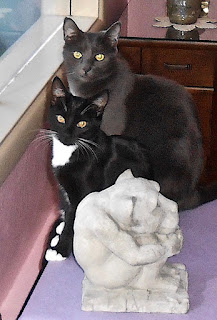Tom (in the comment section to yesterday's post): "I'm no Trump supporter, but while I cannot speak for your Uncle Earl, I
do not believe that everyone who voted for him is an evil hateful
person. My brother-in-law, for example. He voted for Trump.... I don't agree with him on a lot of things.
But I know he's a popular teacher; he's volunteered to help a lot of
disadvantaged kids; and yes, he also volunteers at his church. Anyway, I
suggest you read 'Liberals, You're Not as Smart as You Think' from May
12 NY Times for another perspective. And even so, I don't think the
proper response to hate ... is to hate back."
Just
to be clear... First off, Earl is my father-in-law. Secondly, Trump is not a conservative by any common measure of conservatism that existed
pre-Trump, yet Trump has so dominated the Republican Party (the same party that deplored him a mere two years ago) that it only recognizes
two kinds of people, those who support Trump (who Republicans
euphemistically refer to as conservatives) and everyone else, who they
call liberals. While I might lean more toward the liberal end of the
spectrum than what used to be called the conservative end, I am not a
liberal. For example, I want strong borders; I deplore political correctness; I
favor the death penalty; I'm appalled by "Black Lives Matter;" and where its feasible, I think that long-term welfare recipients should be required to
work. I also agree with yesterday's definition of conservatism inasmuch as it upheld the importance of a balanced budget.
"And even so, I don't think the proper response to hate ... is to hate back."
You
previously expressed the same sentiment in regard to another of my
posts, and I didn't know what you meant then or what you mean now, or
what you would suggest in lieu of what you call hatred. That said, I
think that fear and hatred are understandable responses to being
attacked, and to the extent that they inspire a productive
counterattack, I even think they're admirable. Of course, one can split
hairs, such as many Christians do when they claim to hate the sin but love
the sinner, this despite the fact that their love sure can look like hatred. Do I hate Earl? No. What I see in
Earl is a formerly good man who keeps Fox TV on all day, and
when you expose yourself to hours of lying and ad hominem attacks, day
in and day out, you can't help but be affected. The day that Earl told
me of his admiration for Trump was actually the first time I had ever
seen him angry in the 47 years that I've known him, and, although old
age itself often changes people, the main influence I saw in his anger
was Fox, without which we surely wouldn't have Trump.
I
know whereof I speak because I used to listen to Fox radio (Bill
O'Reilly, Sean Hannity, Lars Larson, and even Michael Savage) for hours
everyday, but after several years I gave it up, the turning point being
when I undertook a serious effort to verify what these men were telling
me. What I found was that Fox would take some story about, let's say, a
condo owners' association telling some aged war veteran that he couldn't
fly his boxcar size American fly all day everyday, and then people like O'Reilly
would omit such details as the size of the flag, and the fact that it
obscured other residents' view of nearby scenery. Finally, he would spend hours
and hours waging personal attacks against the members of the condo
association. He would constantly refer to them as "America haters," and
his staff would uncover every potentially embarrassing thing they had
ever done and twist it to cause maximum humiliation, after
which these poor schmucks would be besieged by insults and death
threats.
After I stopped listening to Fox, I came to feel as if some violence-inducing drug was working its way out of my system, and the
Fox of today is far more virulent than the Fox I used to listen to. In fact, Fox has gotten so bad
that, on the rare occasions that I turn it on, I can't listen for
more than five minutes before I become too disgusted to continue. I have
a blog reader who told me that he listens to Fox so that he can get
"both sides of the story," but Fox doesn't give both sides. Fox doesn't even give one side. Fox only
gives a fictionalized version that is calculated to provoke maximum outrage. Like Fox,
Trump is beside himself with anger every waking moment, and I see Earl
going in the same direction.
Say
what you will about hatred, Tom, there is no longer room in the
Republican Party for anyone who doesn't support Trump, and who could be
more hateful than Trump himself or more cowardly than the Congresspeople
who stand behind him for fear of losing their jobs? My problem is
this: when someone voices support for a man who exhibits continual depravity,
I can't see in that person a good heart or even an intelligent mind, no
matter how mild-mannered he might seem. Think back to Hitler, do you
really believe that all those people who supported Hitler went about
yelling and assaulting people like so many frothing-at-the-mouth mad dogs? No, no, no. While the Brown Shirts were spittle-flecked, most
Nazis seemed like ordinary people, people like Earl, at least until the conversation turned in a direction that set them off.
Supporting
a man like Trump is not something you do if you're good at heart
because Trump's mean-spirtedness and ignobility are so
appallingly obvious. Take his policy of separating immigrant kids from their
families and insisting that he had no choice but to do it because the
Democrats made a law that forces him to do it, yet the Obama
administration didn't do it; no new laws have been passed since Trump
took office; and Trump's OWN PARTY controls both houses of Congress.
When public outrage became overwhelming, Trump signed an executive order
banning the practice of separating children from their families, saying
that he did so because he cares deeply about children. What can any reasonable person conclude from this other than that he was lying when he
said he could do nothing about the problem?
Sadly, another bizarre twist to the story is that the executive order by which Trump claims to have solved the problem is so lame that all but one of the 2,500 children are still separated from their parents (that one sued). Even before he signed the order, Trump was told that it wasn't a problem that an executive order could remedy because the only way to keep the children with their parents would be to do what Obama did which was to release the parents from custody prior to their hearing date (it being unlawful to keep families in prison, and there being no other place to put them). Trump was unwilling to do that, and wouldn't have needed an executive order to do it if he had been willing. He has therefore knowingly left the people who are enforcing America's immigration laws with no way to carry out his executive order. As the days go by, and the kids are still living in detention centers, he will no doubt do what he always does when something doesn't go his way: he'll blame the Democrats and some imaginary "Deep State."
Sadly, another bizarre twist to the story is that the executive order by which Trump claims to have solved the problem is so lame that all but one of the 2,500 children are still separated from their parents (that one sued). Even before he signed the order, Trump was told that it wasn't a problem that an executive order could remedy because the only way to keep the children with their parents would be to do what Obama did which was to release the parents from custody prior to their hearing date (it being unlawful to keep families in prison, and there being no other place to put them). Trump was unwilling to do that, and wouldn't have needed an executive order to do it if he had been willing. He has therefore knowingly left the people who are enforcing America's immigration laws with no way to carry out his executive order. As the days go by, and the kids are still living in detention centers, he will no doubt do what he always does when something doesn't go his way: he'll blame the Democrats and some imaginary "Deep State."
No
one who isn't brainwashed by Fox is likely to be fooled by Trump, and even then, it would require willful ignorance because Trump's lies are as unsophisticated as those of a five year old and there are new ones everyday, often at a rate
of several a day (CNN puts the average lies per day at 6.5*). Trump lies so often that I feel nauseous just trying to remember the ones from a week ago. So,
Tom, you deplore my "hatred," but what would you suggest that I replace
it with given that I truly don't believe that anyone can support Trump
from a position of innocence? While I recognize the necessity of compromise when it comes to electing a president; in order to
support Trump, one has to go beyond mere compromise and into taking the
position that "the ends justify the means," which is the very thing that conservatives used to condemn Communists for doing.
* https://www.cnn.com/2018/05/01/politics/donald-trump-3000/index.html
* https://www.cnn.com/2018/05/01/politics/donald-trump-3000/index.html














